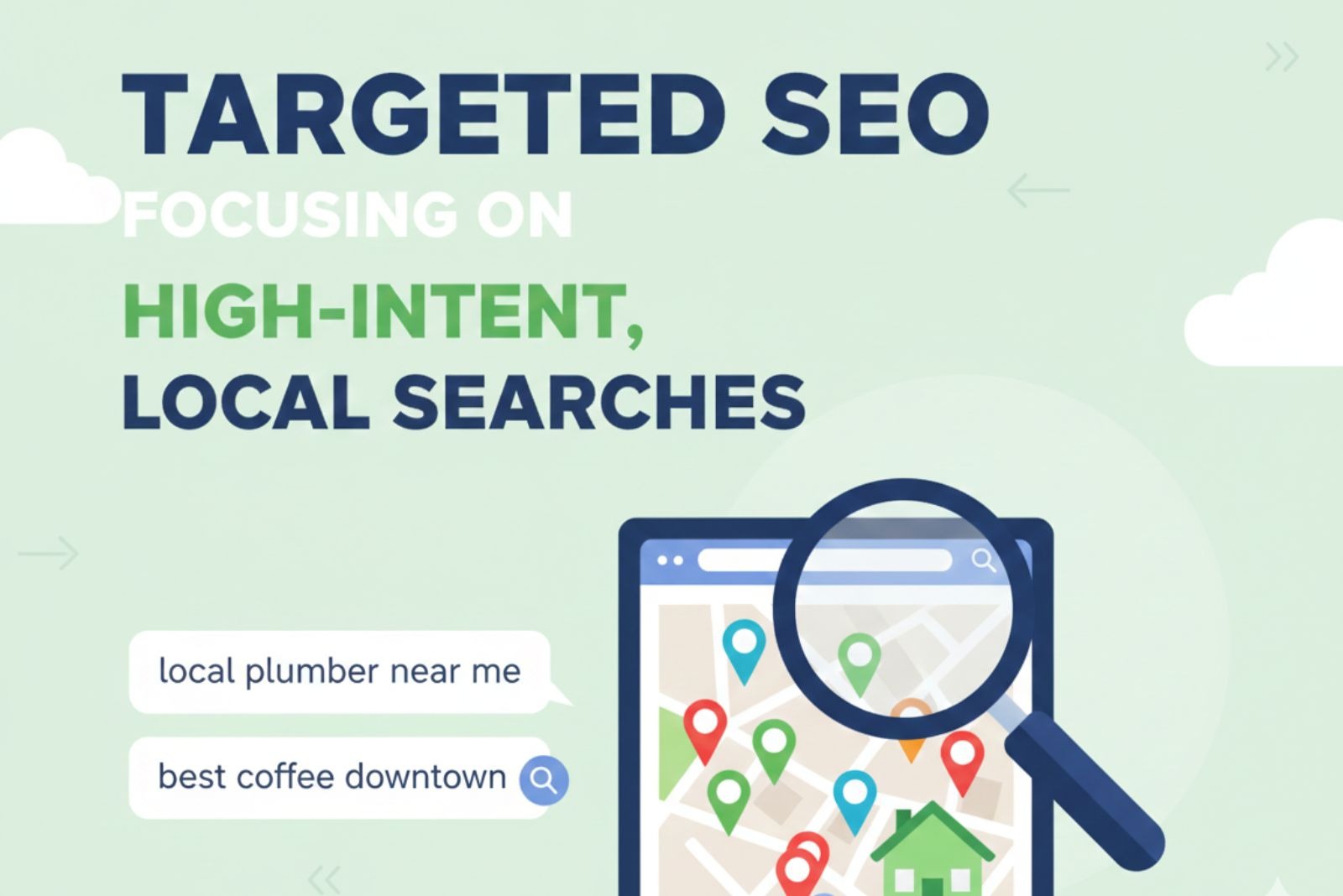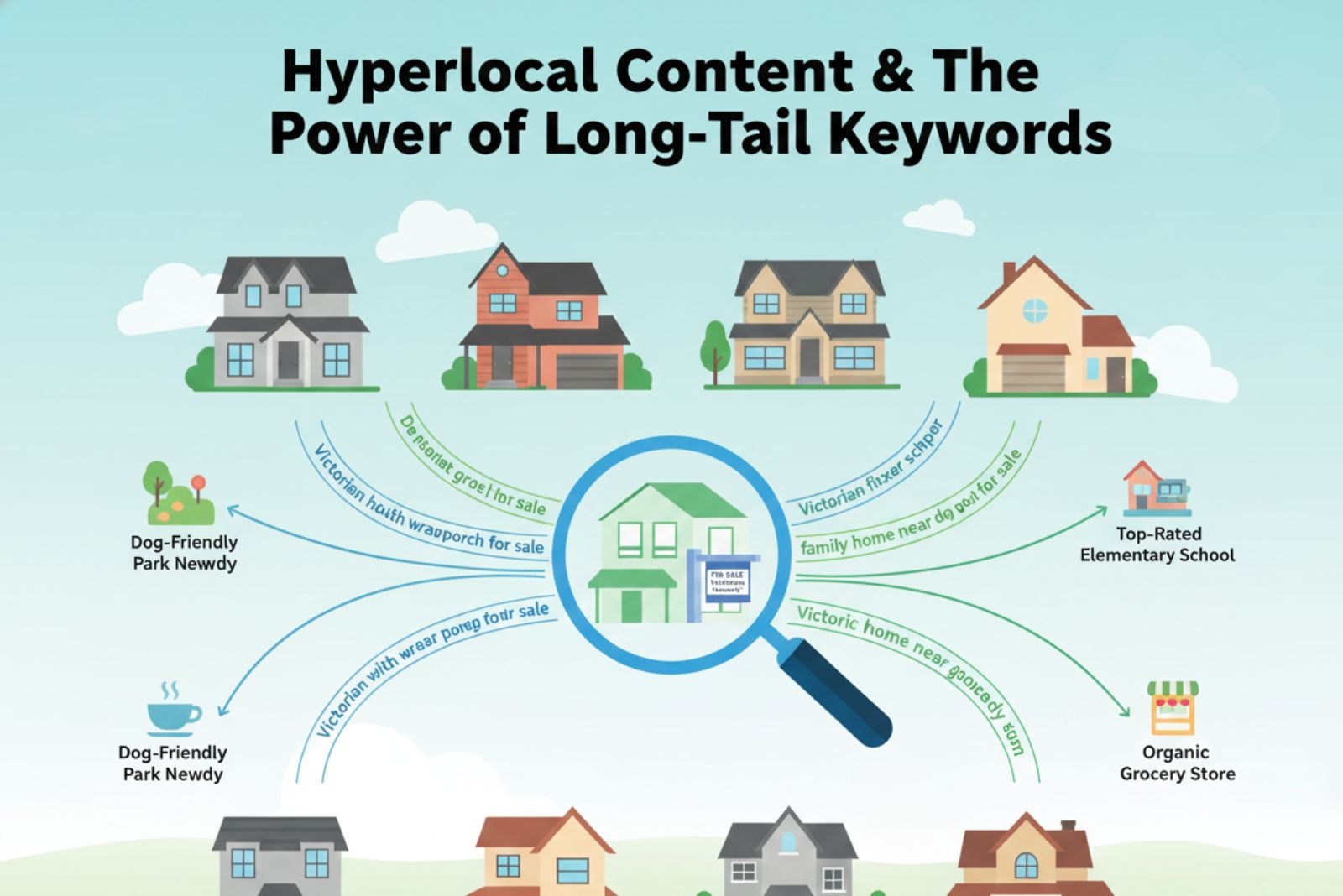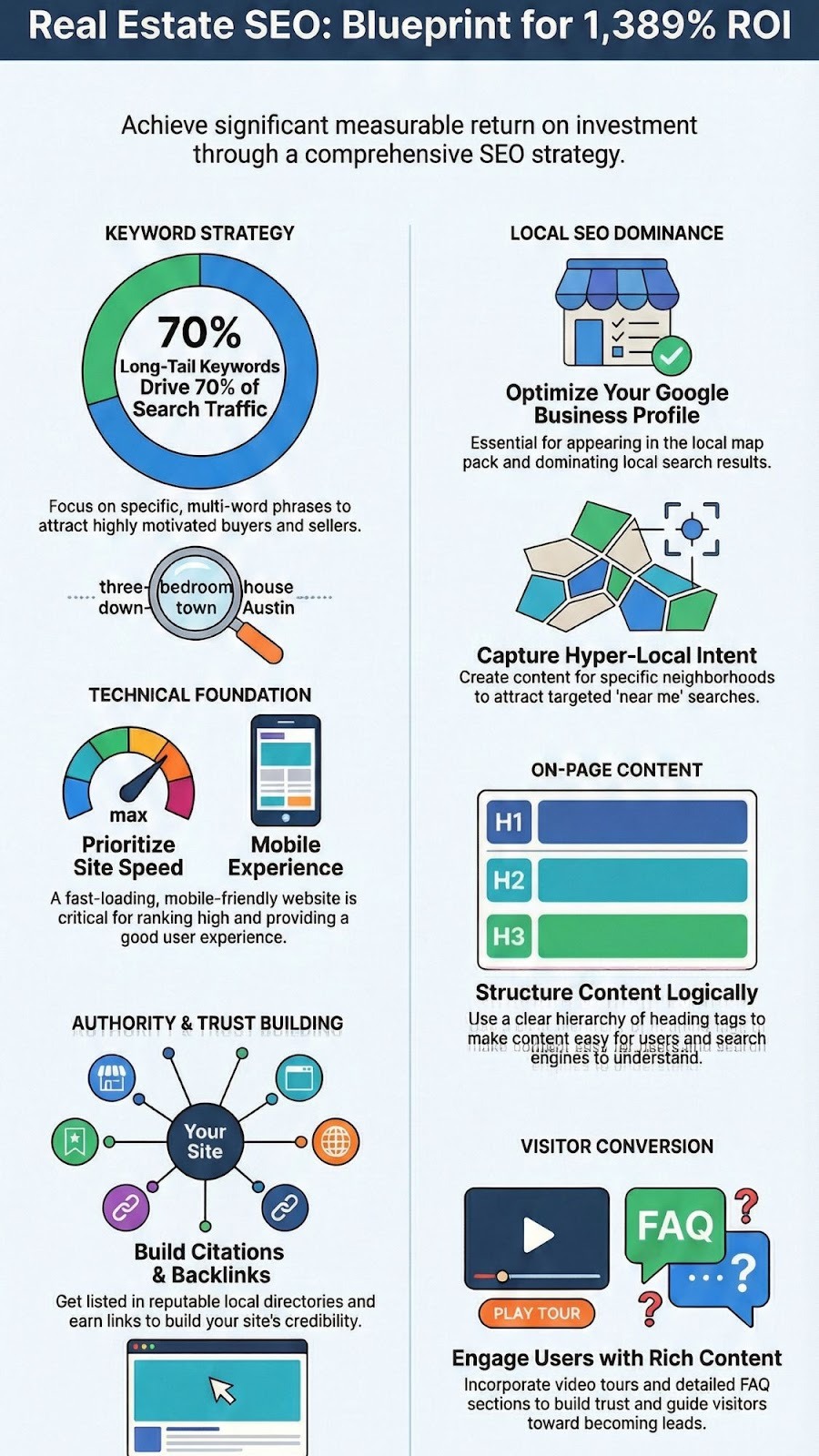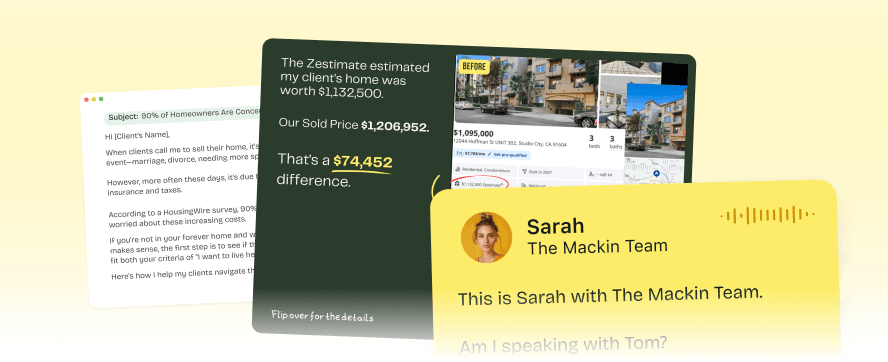
Real Estate SEO: Your Blueprint for 1,389% ROI from Organic Leads
The strategy is about making your website the obvious answer when local buyers and sellers search online. It’s a long game, but the payoff is a marketing asset that works for you 24/7.
You wake up, check your phone, and there it is. An email from a serious buyer who found your website while searching for "three-bedroom homes in Oakwood Estates." No Zillow lead fee, no Facebook ad spend.
The strategy is about making your website the obvious answer when local buyers and sellers search online. It’s a long game, but the payoff is a marketing asset that works for you 24/7. Keep reading to learn how to build it.
Key Takeaways
- Long-tail keywords drive 70% of search traffic and connect you with high-intent buyers (1).
- A fully optimized Google Business Profile is non-negotiable for local map dominance.
- Technical foundations like site speed and mobile-friendliness are critical for ranking and converting mobile users.
Targeted SEO: Focusing on High-Intent, Local Searches

The real estate market shifted when we started analyzing the real estate GCI and commission patterns to prioritize the most valuable leads, then focused on the specific phrases people in her market were actually typing into Google.
Not just "Denver real estate," but "condos with mountain views near LoDo" or "best school districts for young families in Aurora." These are the searches that matter.
They have lower competition and a much higher chance of conversion because the searcher knows exactly what they want. This is the core of a modern real estate SEO strategy. It’s about specificity and local expertise, not trying to out-Zillow Zillow.
Hyperlocal Content & The Power of Long-Tail Keywords

Think about the last time you searched for something online. You probably didn't use one or two words. You asked a full question. Homebuyers are no different. They search with phrases like "townhomes for sale in Maplewood Estates" or "what are the property taxes in Springville."
These longer, specific phrases are called long-tail keywords. Ignoring them means you're missing the majority of people looking for homes in your area.
The competition for these terms is lower. You're not battling national portals for every search. Instead, you're competing with a handful of other local agents. Your advantage? You are the local expert. You can create content that’s deeper and more authentic than any generic portal page.
- Create detailed neighborhood guides that go beyond home prices.
- Write blog posts answering common buyer questions.
- Optimize each property listing page with unique, descriptive text.
Your goal is to have a page that perfectly matches the search intent. When someone finds your guide to "living in the North Hills," they've found a resource, not just a sales pitch. This builds trust and positions you as the authority.
Neighborhood Guides & Local Value
Trulia, Zillow, and other large portals create neighborhood guides at scale, but they’re often pretty bland.
Meanwhile, you, the local expert, can talk about the best coffee shops, quietest streets, how long it takes to drive to the nearest hospital, local historical facts, or even a quick interview with a local business owner. That authenticity can help you outrank the big guys. People want an agent who knows the area inside and out.
If you’re not sure what local topics to write about, some of the best real estate coaches suggest analyzing Google’s "People also ask" feature or using a research tool that shows keyword difficulty and search volume side by side.
You’ll spot opportunities where keywords are highly specific yet still drive traffic to your website. Answer these specific terms in your content—that’s exactly what your future clients are typing into Google.
Don’t Neglect Your Listing Pages
We have seen so many agents who just copy the MLS text into their property listing pages. Big mistake. Not only is it ugly to look at, but Google hates duplicate content, and a bland listing description won’t do anything for your SEO.
Instead, add unique information only you have: mention local parks, the style of the home, or something special about the property.
Reviewing real estate expired listings in your area can also reveal gaps in the market and help you craft content that addresses buyer concerns. If you can, include an FAQ section: "How old is the roof?" "Any recent renovations?" "What’s nearby?"
Including video content or a short walk-through clip can further boost engagement and drive more organic traffic. Not only does this help potential buyers, but it also brings in more keyword-rich text that search engines love.
Optimize Your On-Page: Make Google Fall in Love with Your Website
When your page appears in Google search results, the title tag is the first thing people see. It’s your chance to make a strong impression and earn a click. A good title is concise, around 50-60 characters, and includes your primary keyword.
Think "Homes for Sale in Sunset Park | Jane Agent Realty" or "Living in Bella Vista: A Neighborhood Guide." The meta description is your short advertisement. While it doesn't directly impact rankings, a compelling description can significantly improve your click-through rate.
Once a visitor lands on your page, structure is key. Use heading tags (H1, H2, H3) to break up your content.
A single page claiming you serve "the entire metro area" is far less effective than ten pages each focusing on a specific community. Consistency is also crucial for your NAP (Name, Address, Phone Number).
- Use H1 tags for your main page title.
- Use H2 tags for major sections (e.g., "Schools in the Area").
- Use H3 tags for subsections (e.g., "Elementary School Ratings").
- Maintain a clear heading hierarchy to help both readers and Google understand your content.
- Avoid keyword stuffing; it feels unnatural and Google can detect it.
- Use synonyms and related terms naturally throughout your writing.
- Mention your city and neighborhood names frequently to send strong local intent signals.
- Create dedicated pages for each area if you serve multiple locations.
Ensure this information is identical on your website, your Google Business Profile, and every other online directory. This consistency builds trust and credibility with search engines.
Structuring Content with Headings
Google (and humans) love structured content. Use an H1 tag for your main heading (usually the first heading on your page) like
"Maplewood Estates Real Estate." Then use H2 or H3 subheadings for sections like "Schools in Maplewood Estates" or "Local Dining Options." It’s like handing Google a map of your content, making it easier for the search engine to crawl and figure out what you’re talking about.
Avoid spamming your list of keywords. The days of keyword stuffing are long over. If it feels unnatural to read out loud, it’s probably not good for SEO. Instead, sprinkle synonyms: "Maplewood Estates homes," "property in Maplewood," "living in Maplewood." Remember: optimize your real estate website for both readers and search algorithms.
Local Intent Signals
Mention your city, neighborhood names, and even local landmarks. If you specialize in multiple neighborhoods, create individual pages for each. A single "Serving the entire Dallas area!" page won’t cut it. People (and Google) want hyperlocal detail. Also, ensure your NAP (Name, Address, Phone) is consistent across your site, especially in the footer or contact page. This consistency builds credibility for local search.
This can lead to rich snippets, like address or review stars showing in search results. It’s not a guaranteed ranking boost, but it often improves how your result appears, which can skyrocket click-throughs.
If you’re not sure how to structure your pages, search for your local competitors who are ranking well and see how they have structured their website.
Becoming a Local Authority with Off-Page SEO

Your Google Business Profile might be the most important free tool in your arsenal. If you haven’t claimed and optimized it, do it now.
A complete profile with photos, your correct category ("Real Estate Agent"), hours, and a website link is essential for appearing in the local map pack—the three businesses that show up at the top of local searches. Google wants to send users to businesses it trusts, and a robust profile is a primary trust signal.
Encourage your past clients to leave reviews on your Google Business Profile. Positive reviews are social proof that can influence potential clients. They also contribute to your local ranking. A steady stream of genuine reviews tells Google that your business is active and reputable.
Building Local Authority with Citations and Backlinks
Credits: Jimmy Mackin
Beyond your profile, you need citations. These are mentions of your business name, address, and phone number on other websites like Yelp, local Chamber of Commerce sites, or real estate directories. The key is consistency. Inconsistent NAP information can confuse Google and hurt your rankings.
- Backlinks from reputable local websites act as votes of confidence for your content.
- Examples of reputable sites: Local news sites, community blogs.
- How to earn backlinks:Create valuable content, such as a comprehensive annual market report and publish in-depth interviews with local experts or historians.
You can also reach out to local bloggers or news sites and offer your expertise for a story. These links are powerful, but they must be earned through quality, not bought.
Build Citations & Listings (Consistent NAP)
The key: keep the format consistent everywhere (e.g., "Suite" vs. "Ste." can throw Google off). Tools like Moz Local or BrightLocal can help you hunt down and correct any mismatches. The more quality citations you have, the more legitimate you look to search engines.
Earning Backlinks the Natural Way
Links are like votes of confidence from other websites. A link from a local newspaper, community blog, or even a local event sponsor page is gold for your SEO. The trick is to create content people want to link to. Neighborhood guides? Annual market reports? Interviews with local business owners? All prime link bait.
And don’t be afraid to reach out. If you see a local site covering "Best Neighborhoods for Families," let them know you wrote a detailed guide and are happy to offer any insights. If they link back, that’s a huge credibility booster for your website. Links build authority which improves search engine rankings.
The Non-Negotiable Technical Foundation
Most of your traffic will come from a phone. If your website is slow or difficult to use on a mobile device, you will lose leads. It’s that simple. Google prioritizes mobile-friendly sites, and users will abandon a page that takes more than a few seconds to load.
Use Google’s PageSpeed Insights tool to check your site’s performance. Compress images, minimize code, and choose a reliable hosting provider to ensure a fast experience.
Google needs to be able to "crawl" your site to find and understand your pages.
- Create an XML sitemap as a map of your site for search engines (2).
- Submit your sitemap through Google Search Console.
- Use Google Search Console to monitor crawling errors, such as broken links or inaccessible pages.
- Fix crawling issues to ensure all your content can be discovered by search engines.
- Watch for duplicate content, which can happen if your IDX (property search tool) generates multiple URLs for the same listing.
- Mitigate duplicate content through proper technical settings.
For a listing, you can specify the price, number of bedrooms, and location. When implemented correctly, this can lead to rich snippets in search results—those enhanced listings that show extra information like star ratings or price ranges. This makes your result stand out and can increase clicks.
Speed & Core Web Vitals
Core Web Vitals measure things like how quickly your page elements load and become interactive. It may sound technical, but the takeaway is simple: faster sites rank higher and convert more visitors to your website.
Compress your images (use next-gen formats like WebP), leverage browser caching, reduce or defer scripts, and consider a quality hosting provider. I’ve seen many agents use a cheap "budget host" only to find their site’s speed tanking their SEO efforts.
Crawlability & Indexing
Google needs to "crawl" your site to figure out what pages exist and what they’re about. Make sure you have an XML sitemap and that it’s submitted in Google Search Console. Check for crawl errors or 404 pages (broken links).
If you accidentally set important pages to "noindex," Google won’t list them in search results. Also, watch out for duplicate content—if your IDX pages generate a ton of duplicates for the same listings, consider using canonical tags or customizing how your IDX displays data.
FAQs
What is real estate SEO?
Real estate SEO means making your website easy to find on Google when people search for homes. It helps buyers find you without paying for ads. Using the right words, local neighborhood information, and helpful guides tells Google your site is useful.
Why are long-tail keywords important?
Long-tail keywords are longer search phrases like "three-bedroom homes near Maplewood Park." They help you connect with buyers who know exactly what they want. These searches have less competition and higher chances of converting into a sale.
What is a Google Business Profile?
A Google Business Profile (GBP) is your business listing on Google. It shows your name, address, phone number, hours, photos, and website. Optimizing your GBP helps you appear in local search results and Google Maps.
How do I optimize my listing pages?
Optimize listing pages by adding unique descriptions about the property, neighborhood, and nearby amenities. Avoid copying MLS text. Include photos, videos, or walkthroughs. Add an FAQ section with questions buyers often ask, like “How old is the roof?” or “Any recent renovations?”
What is on-page SEO for real estate?
On-page SEO means organizing and optimizing your website pages so Google understands them. Use headings (H1, H2, H3) to structure content. Include your city and neighborhood names. Add synonyms of your keywords naturally. Write clear title tags and meta descriptions for each page.
How do local citations help SEO?
Local citations are mentions of your business name, address, and phone number on other websites like Yelp or local directories. Consistent information across all sites helps Google trust your business. More citations from reputable sources show search engines that you are a credible local expert.
What are backlinks and why do they matter?
Backlinks are links from other websites to your site. They act like votes of confidence. If a local news site, blog, or community page links to your real estate content, Google sees you as trustworthy. High-quality backlinks boost your search ranking and help more buyers find your website.
How do I improve my site speed?
Site speed is how fast your website loads. A slow site frustrates visitors and lowers your ranking on Google. Compress images using formats like WebP, reduce unnecessary code, and use a reliable hosting provider. Minimize scripts and enable browser caching. Check speed with Google’s PageSpeed Insights.
What is crawlability and why is it important?
Crawlability is how easily Google can find and read your website pages. Google uses bots to "crawl" your site. If it can’t access pages because of errors or broken links, those pages won’t appear in search results.
How do I show local authority online?
Show local authority by creating hyperlocal content about neighborhoods, schools, shops, and local events. Optimize your Google Business Profile and encourage client reviews. Build citations with consistent business info on local directories.
Your Path to Real Estate SEO Mastery
Real estate SEO isn’t a one-time project. It’s an ongoing commitment to becoming the best local resource online. The process starts with understanding what your future clients are searching for and creating content that answers their questions better than anyone else. I
Ready to stop renting your leads and start building your own SEO asset? The team at Listingleads specializes in helping real estate professionals like you dominate local search. Let's talk about building a strategy that delivers serious ROI.
References
- https://www.researchgate.net/publication/374548575_An_Overview_of_Search_Engine_Marketing_A_Systematic_Literature_Review
- https://www.sciencedirect.com/science/article/abs/pii/S0957417410010134
Related Articles
- https://listingleads.com/blog/real-estate-gci-commission
- https://listingleads.com/blog/best-real-estate-coaches
- https://listingleads.com/blog/real-estate-expired-listings

You’re about to make a really smart decision.
ListingLeads.com is your go-to source for all the marketing and sales campaigns you need to attract more listings. Join more than 3,000 agents and get instant access to 285+ proven listing attraction campaigns.

